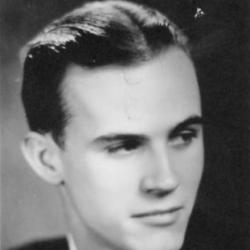Gail T. Kubik

Gail T. Kubik
Competition: US & Canada
As published in the Foundation’s Report for 1943–44:
KUBIK, GAIL. Appointed for creative work in musical composition; tenure, twelve months.
Born September 5, 1914, South Coffeyville, Oklahoma. Education: Eastman School, University of Rochester, B.M., 1934; Chicago Conservatory of Music, M.M., 1935; Harvard University, 1937–38; studies with Walter Piston and Nadia Boulanger.
Instructor in Music, 1935–36, Monmouth College; Instructor in Music, 1936–37, Dakota Wesleyan University; Instructor in Music History, Composition and Orchestration, 1938–40, Teachers College, Columbia University; Program Advisor and Staff Composer, 1940–41, NBC; Lecturer, 1941–42, Rand School, and Finch Junior College; Director of Music, 1942–43, Office of War Information, Bureau of Motion Pictures; Corporal, Army Air Forces, 1944—.
Principal Compositions: The Night Has A Thousand Eyes, sung by Evelyn Kubik, on tour, 1931–34; Two Sketches for String Quartet, performed by the Eastman School, 1932, at the Composers-Forum-Laboratory, 1937; Trivialities for Flute, Horn and String Quartet, by the Eastman School, 1934, at the Composers-Forum-Laboratory, 1937, at the Yaddo Music Festival, the composer conducting, 1940; Trio for Violin, Cello and Piano, by the Eastman School at the American Music Festival, 1935, for broadcast over NBC, 1936, by the Trio Italienne, Rome, Italy, 1936, at the Composers-Forum-Laboratory, 1936–39; American Caprice for Piano and Small Orchestra, by the Monmouth College Orchestra, the composer conducting, 1936, by the Illinois Symphony Orchestra, Alberto Goldberg conducting, 1937, by the Rochester Civic Orchestra, Guy Harrison conducting, 1937, by the New York Federal Orchestra, Joseph Littau conducting, 1939; Serenade for Cello and Piano, performed for broadcast over NBC, 1936, at the Composers-Forum-Laboratory, 1937, by Nathan Chaikin and Leopold Mittman, New York City, 1940; Dance for Piano, by Vladimir Brenner, for broadcast over NBC, 1936, by Yvonne Krinsky, at the Composers-Forum-Laboratory, 1937, by Herbert Livingston, on tour, 1936–39, by Gordon Binkerd, at the Kansas Federation of Music Clubs, 1939; Concerto in One Movement for Violin and Orchestra, by the Illinois Symphony Orchestra, Izler Solomon conducting, at Chicago, 1938, by the Rochester Civic Orchestra, Guy Harrison conducting, 1938, by the National Association of American Composers and Conductors, New York City, 1938; Daniel Drew, by Nadia Boulanger, on tour, 1938–39, by the Madrigal Singers, Lehman Engel conducting, at the Composers-Forum-Laboratory, 1939; Suite for Large Orchestra, by the Rochester Philharmonic, Howard Hanson conducting, 1939, by the NBC Symphony Orchestra, Frank Black conducting, 1941; Solace, at the League of Composers, 1939; A Woman’s Armor, sung by Hope Manning, at the League of Composers, 1939, at the MacDowell Colony Benefit, 1939, at the Composers-Forum-Laboratory, 1939; <i style="mso-bidi-font-style:
normal;”>Slow Movement for String Quartet, at the Composers-Forum-Laboratory, 1939; Scherzo for Large Orchestra, by the Chicago Symphony Orchestra, Frederick Stock conducting, 1941; Concerto for Violin and Orchestra (No. 2), by Jascha Heifetz, season, 1942–43; <i style="mso-bidi-font-style:
normal;”>Sonatina, by Louis Kaufman, on tour, 1943; <i style="mso-bidi-font-style:
normal;”>Paratroops, orchestra suite from the motion picture score, performed by the NBC Symphony for broadcasting, 1943, at the National Art Gallery, 1943, by the Janssen Symphony, Werner Janssen conducting, 1943; Fantasy, for chamber orchestra, by the Rochester Symphony Orchestra, Howard Hanson conducting, 1943; A War-time Litany, for men’s chorus, brass and percussion, by the Army Music School, Fort Myer, Virginia, 1944.
Music for Radio, Theatre, Films: Composer of music for radio programs: World is Yours, series broadcast over NBC, 1940–41; Great Plays, series broadcast over NBC, 1940–41; <i style="mso-bidi-font-style:
normal;”>Whoopee Ti-Yi-Yo, commissioned by CBS and broadcast by CBS Symphony, on Columbia School of the Air program, 1941; <i style="mso-bidi-font-style:
normal;”>Puck, score for Christmas program on NBC, December, 1940; Camptown Races, commissioned by BBC, 1944. Composer of incidental music for They Walk Alone, play by Max Cato, 1941. Composer of music for films: Men and Ships, produced by the U. S. Maritime Commission, 1940; World at War, Paratroops, Dover, Manpower, Colleges at War, produced by the Office of War Information, 1942–43; Memphis Belle, The Earthquakers, American Air Forces, Air Patterns: Pacific, produced by the Army Air Forces, 1943.
Awards: Sinfonia National Competition, 1934; MacDowell Colony Fellowships, 1936–37; Chicago Symphony Golden Jubilee Competition, January, 1941; Jascha Heifetz competition “For Best Violin Concerto by an American Composer,” 1941; Society for Publication of American Music Award, 1943.
Publications of Music: <i style="mso-bidi-font-style:
normal;”>Daniel Drew, 1940; Suite for Three Recorders, 1941; Music for Piano, 1941; Solace, 1941; Sonatina, 1943.